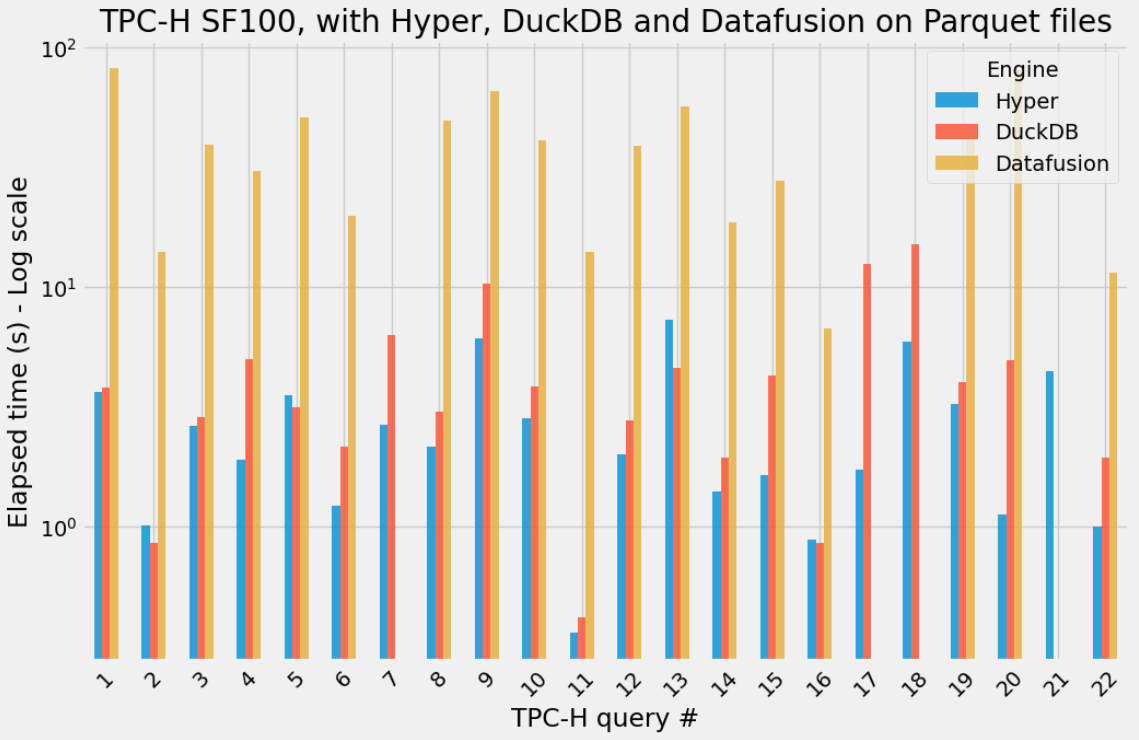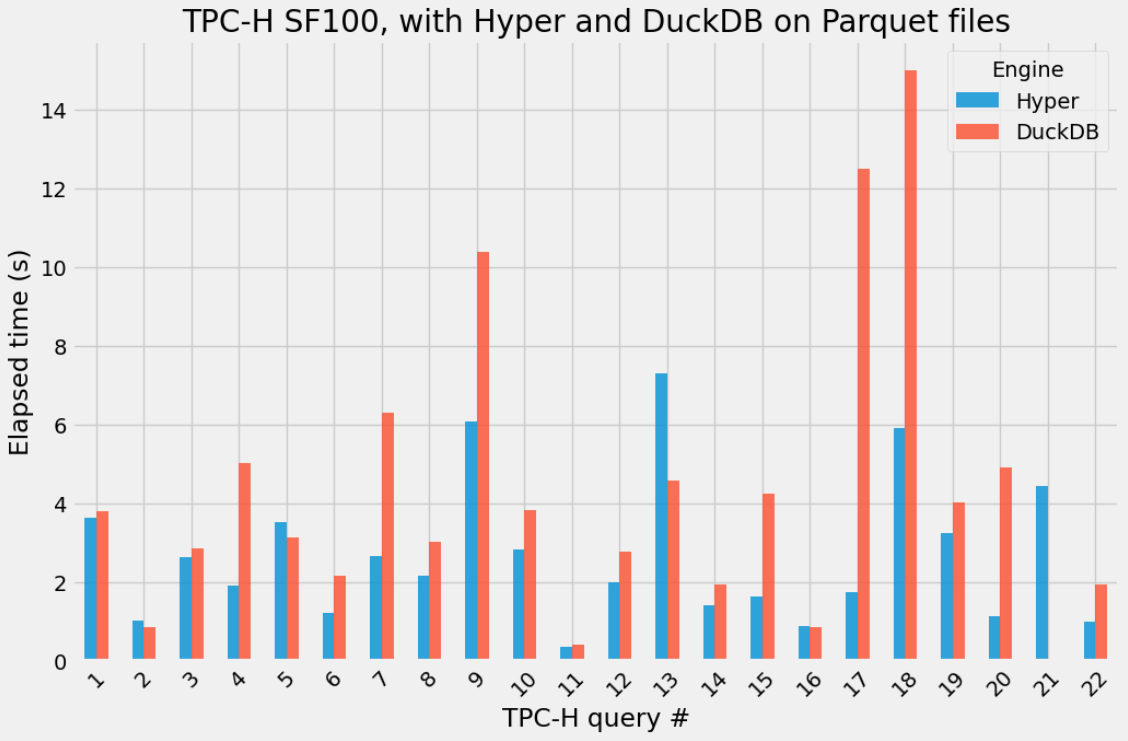TPC-H benchmark of Hyper, DuckDB and DataFusion on Parquet files
Update Apr 14, 2023 - An issue has been opened on the DataFusion GitHub repository regarding its poor reported performance compared to DuckDB and Hyper in this specific case: #5942. While there may be multiple factors contributing to this unexpected behavior, I might have used the API in a sub-optimal way. I will continue to update the post with new findings.

In this blog post, we focus on directly querying Parquet files using three different SQL engines, and more specifically their Python API:
- Tableau Hyper / Proprietary License
- DuckDB / MIT License
- Apache Arrow DataFusion / Apache License 2.0
The TPC-H benchmark is a widely-used measure of such systems’ performance, consisting of a set of queries that have broad industry-wide relevance. We executed the TPC-H benchmark on a laptop and present our findings on the performance and capabilities of each engine on Parquet files.
TPC-H SF100
The TPC-H data used in this benchmark is generated using the DuckDB TPC-H extension and saved into Parquet files with default compression “snappy” and row group size 122880. The benchmark comprises 8 tables, with a scale factor of 100 used for data generation. Each table is stored in a separate Parquet file.
Here’s a brief overview of each table:
| Table name | Row count | Parquet file size |
|---|---|---|
| region | 5 | 1.0 kB |
| nation | 25 | 2.2 kB |
| supplier | 1 000 000 | 80.4 MB |
| customer | 15 000 000 | 1.3 GB |
| part | 20 000 000 | 695.4 MB |
| partsupp | 80 000 000 | 4.5 GB |
| orders | 150 000 000 | 6.8 GB |
| lineitem | 600 037 902 | 27.1 GB |
The lineitem table is the largest, with over 600 million rows and a file size of 27.1 GB.
TPC-H queries
There are 22 queries, specified in the TPC-H documentation; they may vary a little bit depending on each implemnetation. The queries used in this post can be found here on Github. Here is the first one, for example:
SELECT
--Query01
l_returnflag,
l_linestatus,
SUM(l_quantity) AS sum_qty,
SUM(l_extendedprice) AS sum_base_price,
SUM(l_extendedprice * (1 - l_discount)) AS sum_disc_price,
SUM(l_extendedprice * (1 - l_discount) * (1 + l_tax)) AS sum_charge,
AVG(l_quantity) AS avg_qty,
AVG(l_extendedprice) AS avg_price,
AVG(l_discount) AS avg_disc,
COUNT(*) AS count_order
FROM
lineitem
WHERE
l_shipdate <= CAST('1998-09-02' AS date)
GROUP BY
l_returnflag,
l_linestatus
ORDER BY
l_returnflag,
l_linestatus;
System information
The queries are executed on a laptop with the following features:
CPU : 12th Gen Intel© Core™ i9-12900H, 10 cores
RAM : 32 GB
OS : Linux mint 21.1, based on Ubuntu 22.04
Data disk : Samsung SSD 980 PRO 1TB
Package versions:
Python : 3.11.0 | packaged by conda-forge
DuckDB : 0.7.2-dev982
TableauHyperAPI : 0.0.16638
Datafusion : 20.0.0
Parquet files attachment and specific parameters
The attachment process is chosen in a way that the data is not scanned, being almost instantaneous.
Hyper
We used a specific parameter for the Hyper engine, following a discussion with the Tableau Hyper team on Slack:
with HyperProcess(
telemetry=Telemetry.DO_NOT_SEND_USAGE_DATA_TO_TABLEAU,
parameters=dict({("external_table_sample_size_factor", "0.005")}),
) as hyper:
Without this setting, query 9 would crash with an out-of-memory error. The Parquet files are attached as temporary external tables, e.g.:
CREATE TEMPORARY EXTERNAL TABLE region FOR './region.parquet'
DuckDB
The default configuration is used. The Parquet files are attached as views:
CREATE VIEW region AS SELECT * FROM read_parquet('./region.parquet')
Query 21 is crashing with a cannot allocate memory error.
DataFusion
We tried a few parameters such as enable_page_index, pushdown_filters, reorder_filters but without success… The default configuration seems to be limited and we did not figure out how to adjust the settings. Queries 7, 17, 18 and 21 are crashing.
The Parquet files are attached using the Python API:
ctx = datafusion.SessionContext()
ctx.register_parquet('region', './region.parquet')
Results
Only the Hyper engine succeed in running all the queries, in a total elapsed time of 63.90 s, with the connection setup, loop on files etc… Note that this time can be significantly improved by using the respective native storage format of the DuckDB or Hyper engines.
We did not include fetch time in the elapsed time, except for Datafusion. So for DuckDB and Hyper, we only measure the query execution time. The data is fetched in a second step in order to check the number of returned rows.
- DuckDB:
# start timer
conn.execute(query)
# stop timer
result = conn.df()
n_returned_rows = result.shape[0]
- Hyper
# start timer
result = conn.execute_query(query)
# stop timer
n_returned_rows = 0
while result.next_row():
n_returned_rows += 1
result.close()
- Datafusion
# start timer
result = ctx.sql(query)
data = result.collect()
# stop timer
n_returned_rows = 0
for _, item in enumerate(data):
n_returned_rows += item.num_rows
Overall, in this test, Datafusion is behind, while Hyper is a bit more efficient than DuckDB, specifically on some queries.
| query | Hyper (s) | DuckDB (s) | Datafusion (s) |
|---|---|---|---|
| 1 | 3.626 | 3.793 | 81.668 |
| 2 | 1.006 | 0.849 | 13.944 |
| 3 | 2.619 | 2.854 | 39.433 |
| 4 | 1.896 | 5.010 | 30.512 |
| 5 | 3.521 | 3.131 | 51.143 |
| 6 | 1.221 | 2.162 | 19.821 |
| 7 | 2.660 | 6.300 | |
| 8 | 2.151 | 3.021 | 49.717 |
| 9 | 6.085 | 10.374 | 65.606 |
| 10 | 2.820 | 3.825 | 41.010 |
| 11 | 0.360 | 0.416 | 14.066 |
| 12 | 1.991 | 2.773 | 38.985 |
| 13 | 7.303 | 4.588 | 56.703 |
| 14 | 1.402 | 1.936 | 18.684 |
| 15 | 1.634 | 4.254 | 27.640 |
| 16 | 0.882 | 0.848 | 6.699 |
| 17 | 1.728 | 12.502 | |
| 18 | 5.917 | 15.003 | |
| 19 | 3.250 | 4.018 | 42.300 |
| 20 | 1.124 | 4.919 | 80.375 |
| 21 | 4.430 | ||
| 22 | 0.995 | 1.938 | 11.485 |
| Sum | 58.631 | 94.523 | 689.797 |
At the bottom of this table, we display the sum of the querying time, ignoring the failing queries.
All three engines

DuckDB vs Hyper

Conclusion
In this blog post, we conducted the TPC-H benchmark using three different SQL engines: Tableau Hyper, DuckDB, and Apache Arrow DataFusion, for querying Parquet files. The benchmark comprised 22 queries executed on 8 tables, with a scale factor of 100 used for data generation.
With the default settings, it seems that Datafusion may not be the most suitable option for the specific use case mentioned due to its slow performance and tendency to crash. On the other hand, the Hyper engine was found to be faster than the DuckDB engine. But ultimately, the choice of database engine depends on a variety of factors such as the license, the size and complexity of the dataset, the nature of the queries, the available hardware resources…
Overall, the benchmark demonstrated the potential of these SQL engines for handling a significant amount of data stored in Parquet files.